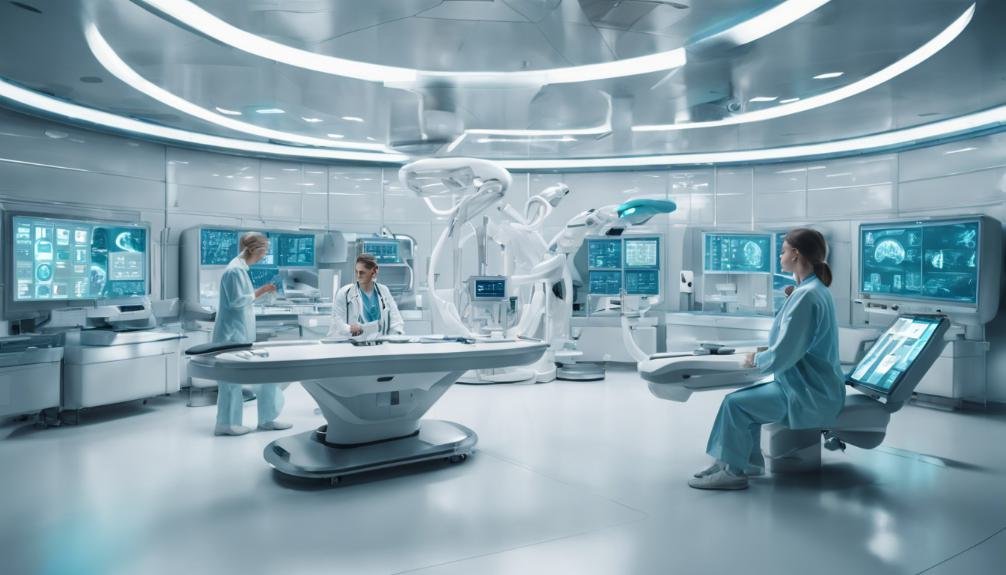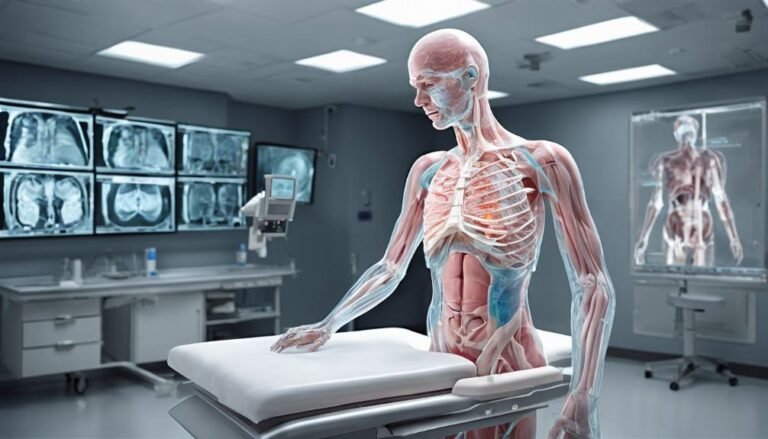AI in Healthcare Quality Assurance
Incorporating AI into healthcare quality assurance practices has fundamentally transformed how healthcare professionals manage and optimize patient care. Imagine a system that not only enhances diagnostic accuracy and streamlines operational processes but also personalizes patient care to unprecedented levels. By utilizing advanced algorithms and predictive analytics, AI is reshaping the future of healthcare quality control. The potential for improving treatment outcomes and ensuring patient safety through AI integration is vast and continues to evolve.
Key Takeaways
- AI enhances diagnostic accuracy with precision tools and vast data analysis.
- AI streamlines operational processes, optimizing efficiency and decision-making.
- Predictive analytics mitigate risks through data-driven interventions for patient safety.
- Automation ensures compliance monitoring accuracy, reducing non-compliance risks.
- AI integration in healthcare quality assurance improves patient outcomes and remote monitoring.
Evolution of Healthcare Quality Assurance
The advancement of healthcare quality assurance has been marked by significant progress in technology and methodologies over the years. As healthcare systems aim to provide high-quality care to patients, they face various challenges in maintaining and improving quality assurance processes.
One of the main challenges is the complexity of healthcare delivery, which involves numerous stakeholders, intricate workflows, and a vast amount of data to manage.
Furthermore, the ever-changing regulatory landscape adds another layer of difficulty to ensuring consistent quality across different healthcare settings. Healthcare organizations must adapt their quality assurance practices to comply with these regulations while also meeting the needs of their patients.
Additionally, the demand for transparency in healthcare quality outcomes has put pressure on providers to continuously monitor and improve their services. This requires the implementation of robust quality assurance systems that can track performance metrics, identify areas for enhancement, and drive overall quality improvement initiatives.
Despite these challenges, the evolution of healthcare quality assurance continues to progress, driven by innovation and a commitment to enhancing patient care.
Role of AI in Quality Control
Incorporating artificial intelligence (AI) into quality control processes revolutionizes healthcare by enhancing efficiency and accuracy in identifying areas for improvement. AI importance in data analysis plays a vital role in transforming traditional quality control methods. Through advanced algorithms, AI can swiftly analyze vast amounts of data to detect patterns and anomalies that might indicate areas needing attention.
This leads to more proactive quality control measures, allowing healthcare providers to address issues before they escalate.
Quality control and innovation integration are at the heart of AI's impact in healthcare. By seamlessly integrating AI into quality control processes, healthcare facilities can streamline operations and enhance overall quality. AI-driven quality control systems can continuously monitor various aspects of healthcare delivery, ensuring standards are met consistently.
This proactive approach not only improves efficiency but also minimizes the risk of errors or oversights that could compromise patient care.
Impact on Patient Safety
AI in healthcare quality assurance has greatly impacted patient safety through improved error detection and enhanced diagnostic accuracy.
By utilizing AI algorithms, healthcare providers can identify potential errors in treatment plans or diagnoses, reducing the risk of adverse events.
The ability of AI systems to analyze vast amounts of data quickly and accurately contributes to a safer healthcare environment for patients.
Improved Error Detection
By enhancing error detection capabilities, artificial intelligence in healthcare greatly contributes to improving patient safety. AI solutions play an important role in error prevention by constantly monitoring and analyzing vast amounts of patient data to identify inconsistencies or anomalies that may indicate errors in treatment plans, medication dosages, or patient monitoring.
Quality assurance in healthcare benefits immensely from AI advancements that can detect errors more efficiently and accurately than traditional methods. AI algorithms can quickly cross-reference patient information with established best practices, guidelines, and past case outcomes to flag potential errors before they cause harm. These systems can also provide real-time alerts to healthcare providers, ensuring timely interventions to rectify mistakes and prevent adverse events.
Enhanced Diagnostic Accuracy
Improving diagnostic accuracy through the utilization of artificial intelligence technology greatly impacts patient safety in healthcare settings. Machine learning algorithms have revolutionized the process of interpreting medical imaging, leading to more precise and efficient diagnoses. In the domain of medical imaging, AI algorithms excel in pattern recognition, allowing for the detection of subtle abnormalities that might be overlooked by human eyes.
By analyzing vast amounts of data and learning from patterns, AI can provide radiologists with valuable insights, reducing the chances of misdiagnosis and ultimately enhancing patient safety.
Moreover, AI can assist in prioritizing urgent cases, ensuring that critical conditions are promptly addressed. For instance, in radiology, AI-powered systems can flag suspicious findings for immediate review by radiologists, expediting the diagnosis and treatment process for patients in need of urgent care.
This enhanced diagnostic accuracy not only improves patient outcomes but also minimizes errors, contributing significantly to overall patient safety in healthcare settings.
Enhancing Diagnostic Accuracy
Enhancing diagnostic accuracy in healthcare through AI involves the utilization of precision in diagnostics and the implementation of AI-driven diagnostic tools.
By leveraging AI technology, healthcare professionals can access more accurate and timely diagnoses, leading to improved patient outcomes.
These advancements in diagnostic accuracy have the potential to revolutionize healthcare delivery and enhance the quality of patient care.
Precision in Diagnostics
Through the integration of advanced AI algorithms, healthcare providers can greatly enhance diagnostic accuracy in medical imaging and laboratory testing. Diagnostic algorithms powered by machine learning applications analyze vast amounts of data to improve data accuracy and performance metrics. By utilizing these sophisticated technologies, healthcare professionals can achieve a higher level of precision in diagnostics.
Machine learning algorithms can detect patterns in medical images or test results that may not be apparent to the human eye. These algorithms continuously learn and adapt from new data, leading to more accurate and reliable diagnoses. Additionally, they can help reduce the margin of error in interpreting complex medical information, ultimately improving patient outcomes.
Furthermore, AI-driven diagnostic tools can assist in identifying early signs of diseases, enabling timely interventions and personalized treatment plans. The ability of AI to process data quickly and accurately enhances the overall efficiency of diagnostic processes in healthcare. As a result, precision in diagnostics is significantly enhanced, providing patients with better quality care.
Ai-Driven Diagnostic Tools
By leveraging AI-driven diagnostic tools, healthcare providers can greatly enhance diagnostic accuracy by harnessing the power of advanced algorithms to improve medical imaging and laboratory testing processes. Machine learning applications play an essential role in these tools, enabling the analysis of vast amounts of data with speed and precision.
Through machine learning, AI systems can recognize patterns in medical images or test results that may be imperceptible to the human eye, leading to earlier and more accurate diagnoses.
Moreover, AI-driven diagnostic tools aid in clinical decision-making by providing healthcare professionals with valuable insights and recommendations based on the analysis of patient data. These tools can help identify potential diseases or conditions, predict patient outcomes, and suggest personalized treatment plans.
Streamlining Operational Processes
To optimize efficiency and effectiveness in healthcare operations, implementing AI technologies can revolutionize how processes are streamlined. AI offers immense potential in enhancing operational efficiency and workflow optimization within healthcare settings. By leveraging AI-powered algorithms, tasks such as scheduling, resource allocation, and patient flow management can be automated and optimized to guarantee seamless operations.
AI can analyze vast amounts of data in real-time, allowing for predictive insights into patient demand, staff allocation, and inventory management. This real-time data analysis enables healthcare providers to make informed decisions promptly, leading to improved resource utilization and patient care outcomes.
Furthermore, AI-driven solutions can identify bottlenecks in processes, suggest improvements, and adapt dynamically to changing circumstances. This adaptability ensures that operational processes remain efficient and responsive to evolving demands within healthcare facilities.
Incorporating AI technologies into healthcare operations can lead to significant enhancements in operational efficiency, ultimately resulting in improved patient experiences and outcomes. By streamlining processes through AI, healthcare organizations can achieve higher levels of productivity and quality in their services.
Predictive Analytics for Risk Management
Implementing predictive analytics in healthcare risk management allows for proactive identification and mitigation of potential risks before they escalate. Through advanced risk assessment and data analysis, predictive analytics leverages machine learning algorithms to analyze vast amounts of data and identify patterns that may indicate potential risks. This process enables healthcare providers to make data-driven decisions and implement targeted interventions to address these risks effectively.
By utilizing predictive analytics, healthcare organizations can enhance their decision support systems, enabling them to prioritize resources and interventions based on the level of risk identified. This proactive approach not only improves patient safety but also optimizes resource allocation and operational efficiency within healthcare settings.
Furthermore, predictive analytics can assist in forecasting potential risks, such as patient readmissions or medication errors, allowing healthcare providers to intervene preemptively. By integrating predictive analytics into risk management strategies, healthcare organizations can enhance patient care outcomes and overall quality of service delivery.
Automating Compliance Monitoring
You can streamline healthcare compliance monitoring by automating processes, which brings about numerous advantages.
AI-powered monitoring systems enhance accuracy by swiftly analyzing vast amounts of data for anomalies or deviations. This efficiency contributes to improved regulatory adherence within healthcare settings.
Compliance Automation Benefits
By automating compliance monitoring, healthcare organizations can streamline regulatory adherence processes and enhance overall quality assurance practices. Regulatory efficiency and cost savings are two significant benefits of automating compliance monitoring.
Automated systems can help healthcare facilities stay up to date with the latest regulatory requirements, reducing the risk of non-compliance penalties. By continuously monitoring and flagging potential compliance issues, errors can be identified and rectified promptly, leading to a reduction in costly mistakes.
Moreover, automation can improve the accuracy of compliance monitoring, minimizing human error and oversight. This precision not only guarantees regulatory compliance but also enhances the overall quality of care provided to patients.
With automated systems in place, healthcare organizations can proactively address compliance issues, ultimately leading to better patient outcomes and higher levels of satisfaction. Embracing compliance automation not only streamlines processes but also fosters a culture of continuous improvement and excellence in healthcare delivery.
AI Monitoring Accuracy
Automating compliance monitoring through AI technologies greatly enhances the accuracy and efficiency of regulatory adherence in healthcare organizations. AI monitoring efficiency is markedly improved by leveraging data analytics insights to identify deviations from compliance standards in real-time. Machine learning capabilities enable the system to learn from historical data, continuously refining its monitoring processes for enhanced accuracy.
By utilizing predictive maintenance strategies, AI can forecast potential compliance issues before they occur, allowing healthcare organizations to proactively address them. This predictive approach not only guarantees regulatory adherence but also minimizes the likelihood of costly violations.
The integration of AI monitoring accuracy in healthcare quality assurance systems offers a proactive and data-driven solution to compliance challenges. Through the continuous analysis of vast amounts of data, AI can provide actionable insights that drive decision-making processes, contributing to a culture of continuous improvement and enhanced regulatory compliance.
Regulatory Adherence Efficiency
Improving healthcare regulatory adherence efficiency through the automation of compliance monitoring processes greatly streamlines oversight and control mechanisms within organizations. By utilizing AI technologies to monitor regulatory compliance, healthcare entities can enhance data privacy measures and uphold industry standards.
Automated systems can continuously track and analyze vast amounts of data in real-time, identifying potential compliance issues promptly. This proactive approach enables organizations to address non-compliance issues swiftly, minimizing risks and maintaining a high level of regulatory adherence.
Automating compliance monitoring not only improves efficiency but also enhances the accuracy and effectiveness of regulatory oversight. AI algorithms can detect patterns and anomalies in data, flagging any deviations from established regulations. This level of scrutiny helps organizations stay ahead of potential compliance violations, ultimately safeguarding patient data privacy and upholding regulatory compliance standards.
Improving Treatment Outcomes
Enhancing patient outcomes through the application of AI in healthcare has shown promising results in optimizing treatment effectiveness and efficiency. By leveraging AI technologies for data-driven decision-making, healthcare providers can tailor personalized treatments based on individual patient characteristics and medical histories. This approach to treatment optimization guarantees that interventions aren't only more effective but also more efficient, ultimately leading to improved patient outcomes.
AI algorithms can analyze vast amounts of patient data to identify patterns and predict which treatments are likely to be most successful for specific conditions. This data-driven approach enables healthcare professionals to make more informed decisions, resulting in treatments that are better suited to each patient's unique needs. As a result, the overall quality of care improves, leading to enhanced patient outcomes and potentially shorter recovery times.
Personalizing Patient Care
Utilizing AI technologies in healthcare enables the customization of patient care based on individual characteristics and medical histories, leading to more effective and efficient treatment outcomes. AI algorithms can analyze vast amounts of patient data to tailor treatments specifically to each individual, taking into account factors such as genetic predispositions, lifestyle choices, and past medical history. This personalized approach enhances the precision of diagnoses and treatment plans, ultimately improving patient satisfaction and health outcomes.
Remote monitoring, facilitated by AI, allows healthcare providers to track patient progress outside of traditional clinical settings. Through wearable devices and smart sensors, real-time data on vital signs, medication adherence, and overall health status can be continuously collected and analyzed. This remote monitoring enables early detection of potential issues, proactive interventions, and adjustments to treatment plans as needed.
Furthermore, the integration of telemedicine with AI technology enhances personalized patient care by offering virtual consultations, remote diagnosis, and treatment recommendations. Patients can conveniently connect with healthcare providers, receive medical advice, and access care from the comfort of their homes. This integration not only improves accessibility to healthcare services but also ensures that patients receive tailored care that meets their specific needs.
Future Trends in AI Integration
As we look ahead to the future of healthcare, the integration of AI is poised to revolutionize and optimize various aspects of patient care and clinical decision-making.
Ethical implications surrounding AI integration in healthcare will become increasingly important. Questions about patient data privacy, consent, and the potential biases in AI algorithms will need to be carefully addressed to guarantee patient trust and confidentiality. Data security will be paramount to safeguard sensitive patient information from cyber threats and unauthorized access.
Implementation challenges may arise as healthcare systems adapt to incorporate AI technologies. Ensuring seamless integration with existing systems, interoperability between different AI tools, and overcoming resistance to change among healthcare professionals will be key hurdles to overcome. Additionally, training requirements for healthcare staff to effectively utilize AI tools and interpret the insights generated will be essential for successful implementation.
Continuous education and upskilling programs will be needed to equip healthcare workers with the necessary skills to harness the full potential of AI in healthcare.
Conclusion
As AI continues to revolutionize healthcare quality assurance, the possibilities for enhancing patient care and improving outcomes are endless.
With advanced algorithms and machine learning capabilities, AI systems are transforming the way quality control is managed in the healthcare industry.
Stay tuned for the exciting developments and innovations that will further shape the future of AI integration in healthcare quality assurance.
The future holds great promise for improved efficiency, accuracy, and proactive monitoring of patient safety.







